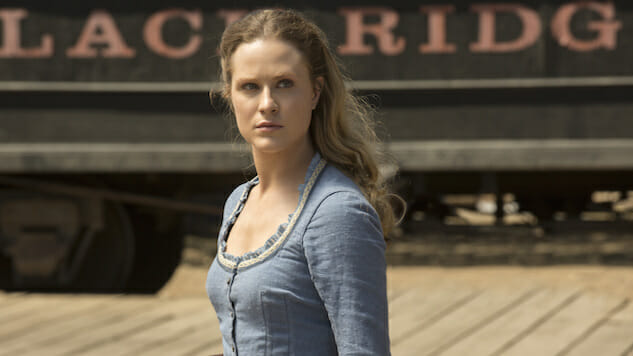Since the first episode of Westworld, HBO’s streaming service, HBO GO, has been offering up something called “The Big Moment.” My assumption was that it was simply a replay of the scene that was most important to the plot of the series, in an effort to draw in curious new viewers, so I ignored it. Tonight, though, it played directly following the season finale, and it turned out to be so much more—and so much more revealing about the show.
The short segment does feature the big moment from each episode, but it also includes the rhapsodizing commentary of the show’s producers and actors. Their intention is to add a layer of depth to what you just watched. Instead, the segment only serves to display just how much the creators of Westworld think of what they have created.
This final “Big Moment” is particularly telling: In it, co-creator Jonathan Nolan talks assuredly about Season Two, which he promises will be the season of “chaos.” But if you know anything about the machinations of promoting a TV series, you can safely assume that all of these little post-show back pats were all filmed in one shot, many months ago. These are nothing like the after-show analysis of After The Thrones or Talking Dead. They’re an even purer form of PR.
What Nolan lets slip in his comments are his complete confidence that a) Westworld was going to be successful enough to guarantee a second season—in reality, the show’s renewal wasn’t announced until just before its eighth episode—and b) he knew they were making prestige television. Why else would he and co-creator Lisa Joy decide to end the first season with so many different characters hanging in the balance?
Without reading any other reviews or social media comments about it, I can guess that a lot of folks are going to praise the daring of Nolan et al. in leaving things unresolved. I’m far less moved by what went down in the course of Sunday night’s extra-long installment. Like so many of the episodes that came before it, I admired so much about Westworld’s season finale and what they attempted to do with it. But it was apparent that, like Ford (Anthony Hopkins), the folks pulling the strings of this series were far too wrapped up in their own genius to see the flaws in what they were creating.
This was such a problem for the episode that the scene that should have left us agog—the moment it finally comes to light that The Man In Black (Ed Harris) is William (Jimmi Simpson), many years older and with a lot more power (he’s the majority owner of Westworld)—felt like an afterthought. Or like the writers were just knocking off another line item on their checklist for how to make a vital, tweet-friendly series, something that has been breathlessly reported on since this series premiered.
That self-awareness and self-satisfaction infects all corners of “The Bicameral Mind,” from the distressingly bloody deaths of two technicians and many members of the security team at the hands of Hector (Rodrigo Santoro) and Armistice (Ingrid Bolsø Berdal) to Ford’s death and the attack on the Delos board members by the many discontinued hosts. They wanted us gasping and tapping out #Westworld at every turn. While the most oft-repeated line in the series (“Violent delights come to violent ends”) comes from Romeo and Juliet, the true tagline of Westworld comes from another Shakespeare play: “A tale… full of sound and fury, signifying nothing.”
If Nolan was truly assured (or told by the execs at HBO) that a second season was confirmed, why not let the show breathe a little bit? He and Joy could have stretched the same narrative over the course of 20 episodes or more, leaving ample room for interludes and diversions that would have strengthened the main themes. Why not let us follow the experience of a female attendee of the park? Or the children who apparently visit Westworld with Mom and Dad? This could have been a novelistic adaptation; it was, instead, constructed like a pulpy comic book movie, right down to a (slightly nauseating) post-credits scene.
For all my complaints, I still stand by my assertion (which you can read in our list of the 25 Best TV Shows of 2016) that Westworld is one of the best dramas of the year. Maybe that says more about the choppy waters of peak TV we’re all swimming in than about the quality of the HBO series. The acting of its ensemble cast, the gorgeous cinematography, and the “big moments” that did connect kept me coming back for more, week after frustrating week.
And I’ll surely be back for more when Westworld returns for round two. I’m only human, after all. I can’t help but wonder what will become of Maeve (Thandie Newton) now that she came so close to escaping before turning back to try to find her android daughter. And I want to know if that little moment in which the revived Bernard (Jeffrey Wright) shows the former Westworld madam that her attempted flight was preordained by a programmer will be writ large on all the so-called conscious hosts. Is Dolores (Evan Rachel Wood) truly conscious, or is that just in her code? I’d also like to know what other worlds beside Westworld and Samurai World Delos is hiding in their underground lair. As high on itself as the show often got, there’s so much untapped potential buried there like an oil reserve. They just need to get the right crew in to tap it. Then, the possibilities will come gushing out.
Robert Ham is an arts and culture journalist based in Portland, OR. Read more of his work here and follow him on Twitter.
